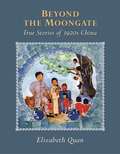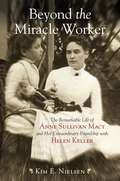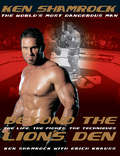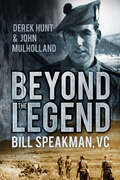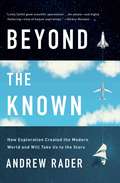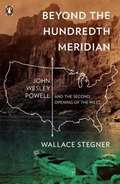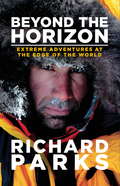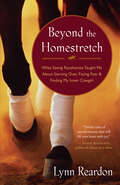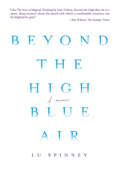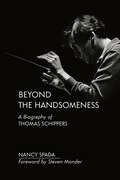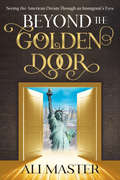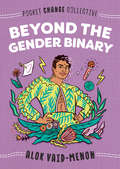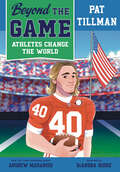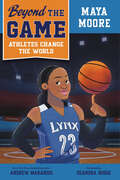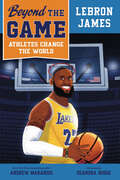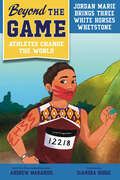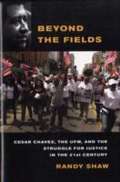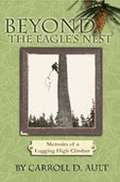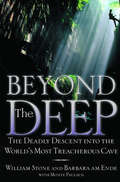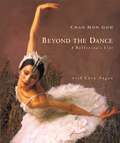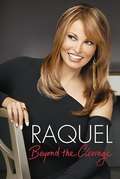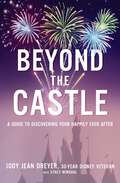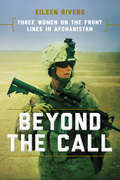- Table View
- List View
Beyond the Moongate
by Elizabeth QuanMOONGATES DOTTED THE LANDSCAPE OF OLD CHINA. Ancient Chinese architects had sculpted stone piled on sculpted stone to form round doorways, with the spiritual symbolism of the full moon. To step through one of these doorways was to step into a world of peace and happiness....And so it was in the 1920s that the Lee King family - father, mother, and six children, aged ten months to seven years - traveled from their home in Canada, across the Pacific Ocean, to inland China. There, they had the opportunity to step beyond the moongate into a land not yet touched by modern warfare or political unrest.The story of the moongate, tells of the two "golden" years the family spent with Grandmother in a remote village in the south, which hadn't changed for centuries. Step inside and live the long lazy days of a China forever gone. The moongate beckons....From the Hardcover edition.
Beyond the Miracle Worker: The Remarkable Life of Anne Sullivan Macy and Her Extraordinary Friendship with Helen Keller
by Kim E. Nielsen<P>After many years, historian and Helen Keller expert Kim Nielsen realized that she, along with other historians and biographers, had failed Anne Sullivan Macy. While Macy is remembered primarily as Helen Keller's teacher and mythologized as a straightforward educational superhero, the real story of this brilliant, complex, and misunderstood woman, who described herself as a "badly constructed human being," has never been completely told. <P>Beyond the Miracle Worker, the first biography of Macy in nearly fifty years, complicates the typical Helen-Annie "feel good" narrative in surprising ways. By telling the life from Macy's perspective-not Keller's-the biography is the first to put Macy squarely at the center of the story. It presents a new and fascinating tale about a wounded but determined woman and her quest for a successful, meaningful life. <P>Born in 1866 to poverty-stricken Irish immigrants, the parentless and deserted Macy suffered part of her childhood in the Massachusetts State Almshouse at Tewksbury. Seeking escape, in love with literature, and profoundly stubborn, she successfully fought to gain an education at the Perkins School for the Blind. As an adult, Macy taught Keller, helping the girl realize her immense potential, and Macy's intimate friendship with Keller remained powerful throughout their lives. <P>Yet as Macy floundered with her own blindness, ill health, and depression, as well as a tumultuous and triangulated marriage, she came to lean on her former student, emotionally, physically, and economically. Based on privately held primary source material, including materials at both the American Foundation for the Blind and the Perkins School for the Blind, Beyond the Miracle Worker is revelatory and absorbing, unraveling one of the best known-and least understood-friendships of the twentieth century.
Beyond the Lion's Den
by Erich Krauss Ken ShamrockThis book highlights the fighting life of Ken Shamrock, one of the most popular professional wrestlers in the WWE and the second most popular combatant in UFC history. It covers Shamrock's beginnings in amateur wrestling, his bouts in the WWE, to his most recent return to the Ultimate Fighting Championship. It exposes the victories, injuries, and personal struggles behind Shamrock's failures and successes. Featuring descriptions of his most pivotal fights, this book is a perfect complement to Inside the Lion's Den and will let readers into the full story of the "World's Most Dangerous Man."Also featured is a complete how-to section that covers Shamrock's most devastating techniques. With easy-to-follow instructions and photographs for 70 techniques, this book teaches Shamrock's entire submission fighting system.
Beyond the Lion's Den
by Erich Krauss Ken ShamrockThis book highlights the fighting life of Ken Shamrock, one of the most popular professional wrestlers in the WWE and the second most popular combatant in UFC history. It covers Shamrock's beginnings in amateur wrestling, his bouts in the WWE, to his most recent return to the Ultimate Fighting Championship. It exposes the victories, injuries, and personal struggles behind Shamrock's failures and successes. Featuring descriptions of his most pivotal fights, this book is a perfect complement to Inside the Lion's Den and will let readers into the full story of the "World's Most Dangerous Man."Also featured is a complete how-to section that covers Shamrock's most devastating techniques. With easy-to-follow instructions and photographs for 70 techniques, this book teaches Shamrock's entire submission fighting system.
Beyond the Legend: Bill Speakman VC
by John Mulholland Derek HuntBeyond the Legend is the authorised biography of William (Bill) Speakman,who was awarded one of only four Victoria Crosses for action in the Korean War. It covers his sometimes controversial life, from his childhood in Altrincham, Cheshire, to his later life in South Africa – about which little has been known previously. Authors Derek Hunt and John Mulholland also explore the myth of the ‘beer bottle VC’ (in which Speakman was said to have fended off the Chinese Communist Army by throwing empty beer bottles at them after they ran out of grenades), bringing to light what really happened on United Hill in November 1951. Speakman held the attacking Chinese army at bay for over four hours and led a final charge that allowed his company to withdraw from the hill. After Korea, he saw active service in Malaya, Borneo and Aden before retiring from the army, with the rank of sergeant, in 1968. Bill Speakman is one of only two surviving VC holders of the British Army and a true British hero.
Beyond the Known: How Exploration Created the Modern World and Will Take Us to the Stars
by Andrew RaderFrom brilliant young polymath Andrew Rader—an MIT-credentialed scientist, popular podcast host, and SpaceX mission manager—an illuminating chronicle of exploration that spotlights humans&’ insatiable desire to continually push into new and uncharted territory, from civilization&’s earliest days to current planning for interstellar travel.For the first time in history, the human species has the technology to destroy itself. But having developed that power, humans are also able to leave Earth and voyage into the vastness of space. After millions of years of evolution, we&’ve arrived at the point where we can settle other worlds and begin the process of becoming multi-planetary. How did we get here? What does the future hold for us? Divided into four accessible sections, Beyond the Known examines major periods of discovery and rediscovery, from Classical Times, when Phoenicians, Persians and Greeks ventured forth; to The Age of European Exploration, which saw colonies sprout on nearly continent; to The Era of Scientific Inquiry, when researchers developed brand new tools for mapping and traveling farther; to Our Spacefaring Future, which unveils plans currently underway for settling other planets and, eventually, traveling to the stars. A Mission Manager at SpaceX with a light, engaging voice, Andrew Rader is at the forefront of space exploration. As a gifted historian, Rader, who has won global acclaim for his stunning breadth of knowledge, is singularly positioned to reveal the story of human exploration that is also the story of scientific achievement. Told with an infectious zeal for traveling beyond the known, Beyond the Known illuminates how very human it is to emerge from the cave and walk toward an infinitely expanding horizon.
Beyond the Hundredth Meridian: John Wesley Powell and the Second Opening of the West
by Wallace StegnerIn this book Wallace Stegner recounts the sucesses and frustrations of John Wesley Powell, the distinguished ethnologist and geologist who explored the Colorado River, the Grand Canyon, and the homeland of Indian tribes of the American Southwest. <P><P>A prophet without honor who had a profound understanding of the American West, Powell warned long ago of the dangers economic exploitation would pose to the West and spent a good deal of his life overcoming Washington politics in getting his message across. Only now, we may recognize just how accurate a prophet he was."This book goes far beyond biography, into the nature and soul of the American West. It is Stegner at his best, assaying an entire era of our history, packing his pages with insights as shrewd as his prose." -Ivan Doig
Beyond the Horizon: Extreme Adventures at the Edge of the World
by Richard Parks Michael AylwinRichard Parks has what must be one of contemporary sport's most extraordinary and inspirational stories. Soon after he turned thirty, the professional career in rugby that had been his life for over a decade was cut short by injury, leaving him faced with an uncertain future. But unlike many other young athletes, Richard decided to tackle his fears, anxiety and depression head on, taking inspiration from Ranulph Fiennes and a line from his grandmother's eulogy - "The horizon is only the limit of our sight" and setting out on challenges that have become part of his everyday life.Richard created history with his first endeavour - the 737 Challenge - by becoming the first person to conquer the highest mountain on each of the world's continents and venture to both the North and South Poles within seven months. Then in 2013 he tackled three hugely challenging events - an ultramarathon through the Peruvian jungle, the world's highest mountain bike race, and a double iron man triathlon in Snowdonia - in preparation for an even more extraordinary challenge: to record the fastest solo, unsupported and unassisted journey to the South Pole. These three challenges and the Antarctic speed record quest that saw Richard ski 11 hours a day enduring perishing conditions, broken skis and spending Christmas and New Year alone on the ice, were all filmed for a major four-part series to be broadcast on Channel 5 later this year.Beyond the Horizon is an amazing, inspiring, and exciting story for armchair adventurers, extreme sports and mountaineering fans alike.
Beyond the Homestretch: What Saving Racehorses Taught Me About Starting Over, Facing Fear, and Finding My Inner Cowgirl
by Lynn ReardonIn Beyond the Homestretch, Lynn Reardon shares an unlikely story. In 2002, she quit her Washington, DC–area office job and moved to rural Texas to open the racehorse adoption ranch LOPE. Since then, LOPE has helped transition more than 750 thoroughbreds into new homes. Though now the director of this high-profile organization, Reardon didn’t learn to ride until she was an adult. Here she presents a vivid inside look into the world of horse racing, complete with colorful horses, jockeys, trainers, and gallop girls, beautifully depicting the insights horses can offer when we reevaluate our relationship with them.
Beyond the High Blue Air: A Memoir
by Lu Spinney“Like The Year of Magical Thinking by Joan Didion, Beyond the High Blue Air is a spare, sharp memoir about the speed with which a comfortable existence can be blighted by grief.” —Bee Wilson, The Sunday Times Lu Spinney’s memoir Beyond the High Blue Air is at once a portrait of the fearlessness of familial love and the profound dilemma posed by modern medicine. When Spinney’s twenty–nine–year–old son, Miles, flies up on his snowboard, “he knows he is not in control as he is taken by force up the ramp,” writes his mother, “skewing sideways as his board clips the edge and then he is hurtling, spinning up, up into the free blue sky ahead . . .” He lands hard on the ice and falls into a coma. Thus begins the erratic loss—Miles first in a coma and then trapped in a fluctuating state of minimal consciousness—that unravels over the next five years. Spinney, her husband, and three other children put their lives on hold to tend to Miles at various hospitals and finally in a care home. They hold out hope that he will be returned to them. With blunt precision, Spinney chronicles her family’s intimate experience. And yet, as personal a book as this is, it offers universal meaning, presenting an eloquent and piercing description of what it feels to witness an intimate become unfamiliar. This is a story about ambiguous loss: the disappearance of someone who is still there. Three quarters of the way through, however, Spinney’s story takes a turn. The family and, to the degree that he can communicate, Miles himself come to view ending his life as the only possible release from the prison of his body and mind. Spinney, cutting her last thread of hope, wishes for her son to die. And yet, even as she allows this difficult revelation to settle, she learns that this is not her decision to make. Because Miles is diagnosed as being in a “minimally conscious state” rather than a “persistent vegetative state,” there is no legal way to bring about his death, a bewildering paradox that Spinney navigates with compassion and wisdom. This profound book encompasses the lyrical revelations of a memoir like Jean–Dominique Bauby’s The Diving Bell and the Butterfly as well as the crucial medical and moral insights of a book such as Atul Gawande’s Being Mortal.
Beyond the Handsomeness: A Biography of Thomas Schippers
by Nancy P. SpadaA lightning rod for powerful emotions, Thomas Schippers began his escalation to fame at nineteen continuing with performances in many renowned venues in the world. Here his career is traced through the accounts of those who knew or performed with him, red
Beyond the Golden Door: Seeing the American Dream Through an Immigrant's Eyes
by Ali MasterIn this powerful and inspiring memoir, a Pakistani immigrant shares his story of finding new freedoms and a new faith in America.It&’s easy to talk about freedom. But unless someone has lived in a world that suffocates freedom, it&’s difficult to appreciate the liberty found in America. This is the true story of a Pakistani Muslim who immigrates to the United States for college and discovers five transformational freedoms along the way: the freedom to fail and start over, to love, to choose one&’s faith, to be an entrepreneur, and to self-govern.Contrasting these precious freedoms with the life he lived in Pakistan, Ali&’s story reveals that God is the true source of liberty as He works in people&’s lives to bring about redemption. A call to value and preserve American freedoms, Beyond the Golden Door is also an invitation for readers to consider ultimate freedom in Jesus Christ.
Beyond the Gender Binary (Pocket Change Collective)
by Alok Vaid-MenonIn Beyond the Gender Binary, poet, artist, and LGBTQIA+ rights advocate Alok Vaid-Menon deconstructs, demystifies, and reimagines the gender binary. <p><p> Pocket Change Collective is a series of small books with big ideas from today's leading activists and artists. In this installment, Beyond the Gender Binary, Alok Vaid-Menon challenges the world to see gender not in black and white, but in full color. Taking from their own experiences as a gender-nonconforming artist, they show us that gender is a malleable and creative form of expression. The only limit is your imagination.
Beyond the Game: Pat Tillman (Beyond the Game: Athletes Change the World)
by Andrew MaranissBeyond the Game is a nonfiction chapter book series about athletes who have stepped up beyond sports to make a difference in the world, from acclaimed author Andrew Maraniss and illustrator DeAndra Hodge. This is the story of NFL star Pat Tillman, who gave up his NFL career to enlist in the army.In this chapter book biography by acclaimed author Andrew Maraniss, readers learn more about the life and work of Pat Tillman—an NFL player who left his career with the Arizona Cardinals to enlist in the army after 9/11, and ultimately was killed by friendly fire.After 9/11, Pat Tillman felt it was his duty as an American to stand up for the country, even though he was a pro football player in the prime of his career. He was someone who matched his toughness on the field with a soft heart, someone who always stood up for the underdog, and someone who felt an obligation to do the right thing—not depend on other people to do it. And for all his actions, Tillman often questioned his role in the military and the war—revealing the depths of his integrity and the ethical way he lived his life.Through his actions and his legacy, Pat Tillman has changed the world beyond sports.Complete with black-and-white illustrations throughout, statistics, resources, and ways for kids to make a difference on their own—Beyond the Game is a giftable and inspirational series for every reader.
Beyond the Game: Maya Moore (Beyond the Game: Athletes Change the World)
by Andrew MaranissBeyond the Game is a new nonfiction chapter book series about athletes who have stepped up beyond sports to make a difference in the world, from acclaimed author Andrew Maraniss and illustrator DeAndra Hodge. This is the story of WNBA star Maya Moore and her social justice work.Before she became one of the most famous basketball players on the planet, before she began speaking out for prison reform, Maya Moore was just a kid.In this chapter book biography by acclaimed author Andrew Maraniss, readers learn more about the life and work of Maya Moore—from growing up with a single mother in Jefferson City, Missouri, to her journey to becoming a star player at UCONN and the WNBA, to her social justice fighting for prison reform and speaking up for Black Lives Matter.While known as one of the greatest basketball players of all time, Maya Moore has changed the world beyond sports.Complete with black-and-white illustrations throughout, statistics, resources, and ways for kids to make a difference on their own—Beyond the Game is a giftable and inspirational series for every reader.
Beyond the Game: LeBron James (Beyond the Game: Athletes Change the World)
by Andrew MaranissBeyond the Game is a new nonfiction chapter book series about athletes who have stepped up beyond sports to make a difference in the world, from acclaimed author, Andrew Maraniss and illustrator DeAndra Hodge. This is the story of LeBron James and his social justice work.Before he became one of the most famous basketball players on the planet, before he began speaking out for justice, LeBron James was just a kid.In this chapter book biography by acclaimed author Andrew Maraniss, illustrated by DeAndra Hodge, readers learn more about the life and work of LeBron James—from growing up with a single mother in Akron, Ohio, to his journey to the NBA and ten NBA championships, to his social justice work creating I PROMISE and speaking up for Black Lives Matter.While known as one of the greatest basketball players of all time, LeBron James has changed the world beyond sports.Complete with black-and-white illustrations throughout, statistics, resources, and ways for kids to make a difference on their own—BEYOND THE GAME is a giftable and inspirational series for every reader.
Beyond the Game: Jordan Marie Brings Three White Horses Whetstone (Beyond the Game: Athletes Change the World)
by Andrew MaranissThe BEYOND THE GAME series features athletes who have stepped up beyond sports to make a difference in the world, from acclaimed author Andrew Maraniss and illustrator DeAndra Hodge. This is the story of Indigenous professional runner Jordan Marie Brings Three White Horses Whetstone and her social justice work organizing and advocating for Indigenous people.Before she became a professional runner and a respected community advocate, before she began speaking out for Indigenous causes and peoples, Jordan Marie Brings Three White Horses Whetstone was just a kid.In this chapter book biography by acclaimed author Andrew Maraniss, readers learn more about the life and work of Jordan Marie Brings Three White Horses Whetstone—from growing up Lakota in South Dakota, to her journey to becoming a Division 1 runner in college and later a professional runner, to her work in Washington DC advocating for Indigenous people and communities. Jordan Marie Brings Three White Horses Whetstone has changed the world beyond sports.Complete with black-and-white illustrations throughout, as well as statistics, resources, and ways for kids to make a difference on their own—Beyond the Game is a giftable and inspirational series for every reader.
Beyond the Fields: Cesar Chavez, The UFW, and the Struggle for Justice in the 21st Century
by Randy ShawShaw reveals the untold story behind "si se puede," which is still setting the course for today's progressive movements, by tracing the legacy of Chavez and the United Farm Workers of America (UFW).
Beyond the Eagle's Nest: Memoirs of a Logging High Climber
by Carroll AultSouthwest Nebraska, 1922-40. Grandfather referred to me as "That boy". Friends, teachers, and neighbors seldom used my given name. Newcomers pondered my surname. "Without a father to guide him," they whispered, "that kid'll never amount to a tinker's dam. More than once, he'll wish they'd left him for the coyotes, especially if his eyes go bad like others in that family." Washington State--Big trees, big men, big problems, 1940-59. "Man on! Going up!" For fifteen years, these words sent me to the top of a 140-foot logging spar, hallmark and pinnacle of Pacific Northwest logging.
Beyond the Deep: The Deadly Descent into the World's Most Treacherous Cave
by William Stone Barbara Am Ende Monte PaulsenBeyond the Deep is an adventurous, firsthand account of a great caving expedition located in Oxaca, Mexico. A group of spelunkers attempt to delve deep into the most dangerous cave on earth: the Sistema Huautla.
Beyond the Dance: A Ballerina's Life
by Cary Fagan Chan Hon GohShortlisted for the Rocky Mountain Book AwardNominated for The Rocky Mountain Book Award (An Alberta Children's Choice Book Award)Nominated for the 2003 Norma Fleck Award for Canadian Children's Non-FictionAn elegant, expressive dancer, Chan Hon Goh is one of the ballet world's great stars. She is a brilliant technician possessing a delicate beauty and radiant stage presence. Born in Beijing to dancer parents, she tells the story of their flight to Canada from an oppressive regime that thwarted her father's career, her rigorous training, and her battle to achieve acceptance as the only Chinese-born primaballerina in the history of the National Ballet.This fascinating look at the life of a dancer will appeal not only to the legions of Chan Hon Goh's admirers and to students of ballet, but also to young readers who understand what it is to pursue a dream.From the Hardcover edition.
Beyond the Cross and the Switchblade
by David WilkersonFrom the Book Jacket: uthor, David Wilkerson, what has happened since its publication in the early 1960s. Their gratifying interest in his story and his ministry has prompted him to bring his many readers up-to-date with a fitting sequel-and BEYOND THE CROSS AND THE SWITCHBLADE is just the book we've all been waiting for. Here is a nostalgic look back at memorable characters from the original book and a brief review of what they're doing today. We are treated to a behind-the- scenes look at the making of the movie version of THE CROSS AND THE SWITCHBLADE, starring Pat Boone, and find that, surprisingly, the venture brought fame but not fortune. The publicity accompanying the book and the movie turned the skinny preacher from Pennsylvania into a reluctant celebrity, and eventually forced him to withdraw from the rat race for a while. Only then was he able to place things in their proper perspective-waiting upon "Holy Ghost timing," as he puts it-thus renewing his person-to-person ministry that had been temporarily sidetracked by other commitments. The past decade was filled with many ups and downs for the entire Wilkerson family, and David frankly recounts it all: his wife Gwen's gallant bout with cancer, his brother Jerry's now- conquered battle with alcoholism. Yet BEYOND THE CROSS AND THE SWITCHBLADE is far more than reminiscences of THE CROSS AND THE SWITCHBLADE; it is a very now book in which David Wilkerson speaks directly to the most pressing needs of today. A large portion of the book is concerned with the phenomenon of drugs in the suburbs. Unfortunately, in the years since David Wilkerson labored for the Lord in the back alleys of the ghettos, drug use has spread to the backyards of suburbia. A chapter is devoted to the related subject of the forgotten teen-agers, those good, clean-cut kids of relative affluence who nevertheless have many serious problems and who need to come to Jesus just as desperately as their more publicized contemporaries, the juvenile delinquents. All in all, David Wilkerson's Teen Challenge is constantly redirecting itself to meet these new challenges. Throughout, spiritual lessons intermingle with heartwarming human interest episodes to imbue BEYOND THE CROSS AND THE SWITCHBLADE with that singular, "can't put it down" quality that marks a sure-fire best seller. The Trusting Place Two Odd "Success" Stories The Day I Quit the Rat Race Drugs in the Suburbs The Forgotten Teen-Ager The Fear I Couldn't Conquer
Beyond the Cleavage
by Raquel WelchShe didn't hatch out of an eagle's nest, circa One Million Years B.C., clad in a skimpy fur bikini. For many years after making her Hollywood entrance as every man's fantasy, Raquel Welch was best known for her beauty and sex appeal.
Beyond the Castle: A Guide to Discovering Your Happily Ever After
by Glen Keane Jody Jean Dreyer Stacy L. WindahlWhen the credits roll and you've left the park, when your Disney day is over, how do you take the magic with you into your everyday work and life?Jody Jean Dreyer worked for the Walt Disney Company for 30 years and in Beyond the Castle she shares one-of-a-kind stories and insights into what sets the Disney experience apart, as well as secrets to help readers discover their own “happily ever after.”Beginning with her first position as a summer intern at Walt Disney World, through her role leading synergy and special projects for Disney (reporting to former CEO Michael Eisner), to her work with top leadership at Walt Disney Motion Pictures sharing the magic of Disney films around the world, Jody unpacks secrets that can change the way we understand ourselves, our work and relationships, and how we can find our own path to happiness. You will read her stories about working with Walt’s nephew, Roy E. Disney, her front-line role in the opening of theme parks around the world and her own journey to discovering how to bring some Disney magic into every day.The wish for happy endings is written in our hearts. Every park guest or movie watcher is looking for their own “happily ever after,” as they ask the questions: What’s my story? Does it matter? Will the story end well for me? Jody’s personal experiences and her underpinning faith help her to offer practical and sometimes unexpected principles to better appreciate and navigate our own stories.Jody’s entertaining storytelling will satisfy a reader's desire to open the doors and peek inside the castle – and more, to unlock and illuminate life’s true treasure.
Beyond the Call: Three Women on the Front Lines in Afghanistan
by Eileen RiversA riveting account of three women who fought shoulder-to-shoulder with men and worked with local women to restore their lives and push back the TalibanThey marched under the heat with 40-pound rucksacks on their backs. They fired weapons out of the windows of military vehicles, defending their units in deadly battles. And they did things that their male counterparts could never do--gather intelligence on the Taliban from the women of Afghanistan. As females they could circumvent Muslim traditions and cultivate relationships with Afghan women who were bound by tradition not to speak with American military men. And their work in local villages helped empower Afghan women, providing them with the education and financial tools necessary to rebuild their nation--and the courage to push back against the insurgency that wanted to destroy it. For the women warriors of the military's Female Engagement Teams (FET) it was dangerous, courageous, and sometimes heartbreaking work.Beyond the Call follows the groundbreaking journeys of three women as they first fight military brass and culture and then enemy fire and tradition. And like the men with whom they served, their battles were not over when they returned home.
